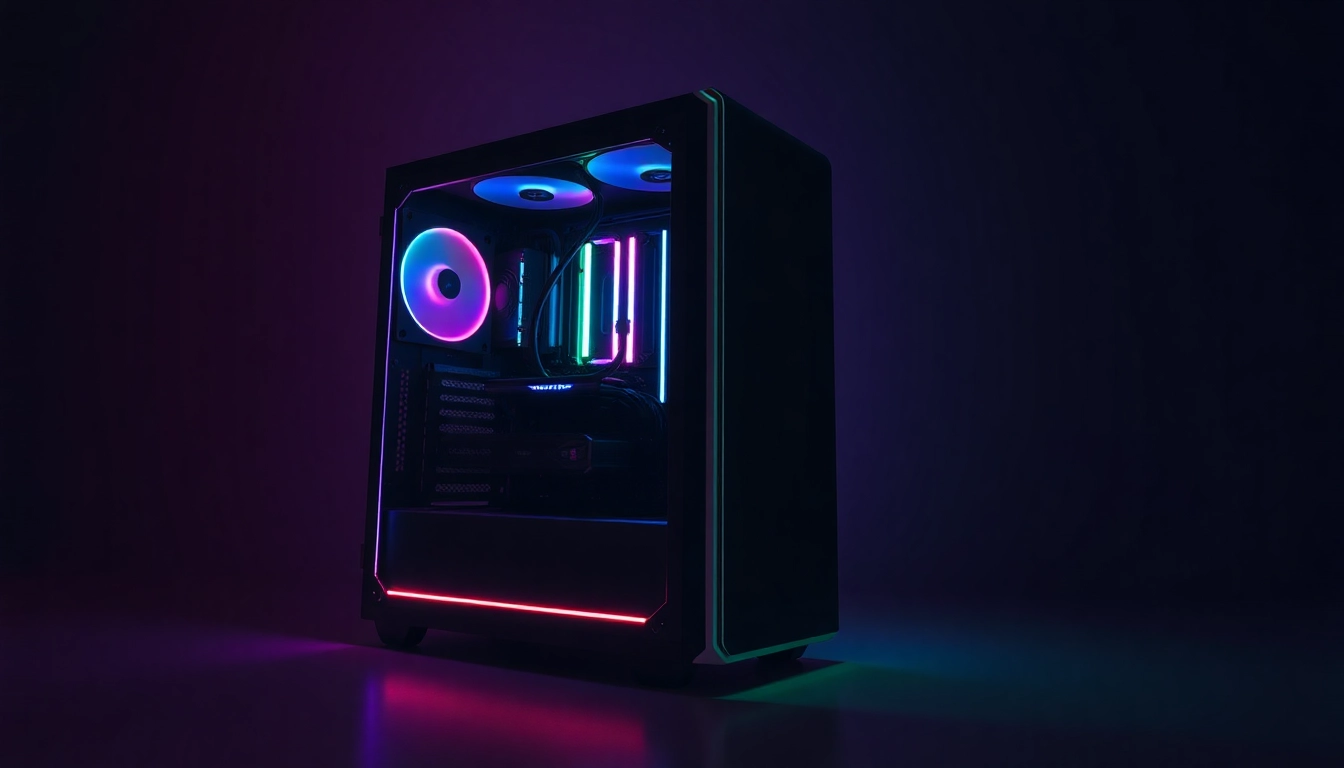1. Understanding the Importance of a Gaming PC Case
When it comes to building a computer, particularly a gaming setup, the significance of selecting the right gaming pc case cannot be overstated. The case serves as both a protective shell and an essential structural component that houses all vital hardware, including the motherboard, graphics card, and storage drives. Understanding the core importance of a gaming PC case will help enthusiasts and gamers make informed decisions that can enhance performance and aesthetics.
1.1 What Defines a Quality Gaming PC Case?
A quality gaming PC case is defined by several factors. Durability, made from high-grade materials such as steel or aluminum, ensures that the case can withstand the test of time while providing adequate protection to sensitive components. Additionally, a good gaming case should offer excellent airflow, preventing overheating during intense gaming sessions. Moreover, the layout and design of a case are critical—ensuring sufficient space for both current and future upgrades—or ensuring compatibility with various components, whether they are standard ATX motherboards or compact ITX setups.
1.2 Factors to Consider When Selecting a Gaming PC Case
Selecting a gaming PC case entails several considerations:
- Size: The case size must correspond to the components within it. For instance, a mid-tower can accommodate most standard builds while a mini-tower could be appropriate for less demanding setups.
- Airflow: Fans and ventilation are critical to maintaining optimal temperatures. Look for cases with mesh panels or large fan mounts.
- Expandability: As technology continually evolves, ensure that your case has enough room for future upgrades, such as additional storage or more powerful graphics cards.
- Aesthetics: This is subjective but often crucial for gamers. Many opt for cases with RGB lighting or a glass side panel to showcase their components.
1.3 The Impact of Case Design on Gaming Performance
The design of a gaming PC case does not merely affect its looks but also its functionality and performance. A well-ventilated case ensures that air flows continuously, significantly impacting cooling efficiency. Cases that trap heat can lead to thermal throttling, where components like CPUs and GPUs reduce their performance to avoid overheating. Therefore, choosing a case designed with efficient airflow can enhance performance by allowing more reliable and sustained operation during gaming.
2. Key Features of High-Performance Gaming PC Cases
2.1 Cooling Solutions: Airflow and Ventilation
Effective cooling solutions are critical for any gaming setup to maintain performance during prolonged use. Cases that offer support for multiple fans, liquid cooling systems, and adequate ventilation can significantly reduce internal temperatures. High-performance gaming cases are typically equipped with numerous fan mounting points, specifically designed to accommodate various sizes and configurations, allowing gamers to adapt their cooling solutions based on current needs.
2.2 Compatibility with Components: Size and Layout
Compatibility with internal components is another crucial aspect when selecting a gaming PC case. Towers range in size from compact ITX cases to large E-ATX or super-tower cases capable of housing multi-GPU setups. For instance, when selecting a case, consider the GPU’s length, the CPU cooler’s height, and the overall arrangement of hard drives. A case that provides ample space and includes removable drive cages offers users the flexibility to tailor their gaming rig according to personal performance demands and aesthetics.
2.3 Aesthetic Elements: RGB and Windowed Cases
The visual appeal of gaming setups plays a significant role in selecting a gaming PC case. Cases featuring tempered glass panels are popular as they allow users to showcase LED lighting and internal configurations. RGB lighting has become a highly aesthetic trend in PC build designs. Users can coordinate colors to match their gaming rig’s theme. Furthermore, custom mods and personal touch reflect a user’s personality, making aesthetics an important aspect in increasing overall enjoyment of the gaming experience.
3. Popular Gaming PC Case Brands and Their Offerings
3.1 Comparison of Leading Gaming PC Case Brands
Several brands dominate the gaming case market, each with its own strengths and target demographics. Corsair, known for high-quality designs and exceptional airflow, offers a range of options suitable for various performance levels. NZXT is recognized for its stylish cases, emphasizing aesthetics alongside functionality. On the other hand, Fractal Design focuses on minimalistic styles combined with robust functionality. For budget-conscious gamers, brands like Thermaltake and Cooler Master offer great value without compromising quality.
3.2 New Arrivals and Emerging Brands in the Market
As the demand for unique and performance-oriented cases increases, new brands continue to emerge. Companies like HYTE and Lian Li are gaining traction for their innovative designs and ecological approaches. For instance, HYTE’s Y60 case has been praised for its vertical layout and excellent cooling support. Additionally, modular cases are becoming more popular, as they allow users to switch configurations easily without requiring extensive time or tools.
3.3 Understanding Brand Reliability and Support
When investing in a gaming PC case, understanding the reliability of brands is essential. A brand’s reputation often reflects the quality of the materials used and the overall design durability. Purchasing from reputable brands generally ensures long-term support, including warranty coverage and responsive customer service. Researching online reviews and seeking feedback on forums can provide insightful information on overall user satisfaction with specific brands and models.
4. Building Your Gaming Rig: Case Selection Tips
4.1 How to Choose the Right Size for Your Setup
Choosing the right size for your gaming PC case involves evaluating both space and component needs. Measure your available workspace and consider the dimensions of the components you plan to install. Many cases specify the maximum length for graphics cards and height for coolers, so ensure that your selected case can accommodate your parts without obstruction.
4.2 Customizing Your Gaming PC Case: Modding Ideas
Modding provides an exciting avenue for personalization. Gamers often customize their cases by adding custom paint, modding their fan setups, or incorporating elaborate lighting schemes. Some enthusiasts may design their PC cases from scratch or use 3D printing to achieve unique designs. Online communities provide a wealth of inspiration and guidance for anyone looking to enhance their case with custom features.
4.3 Setting Up Cooling Solutions in Your Case
Proper cooling setup is pivotal in any gaming PC. Consider factors such as the optimal fan layout—intake and exhaust placements can significantly affect airflow. Utilizing high-quality fans and, if possible, integrating a liquid cooling solution can provide superior thermal management. Conduct thermal benchmarks before and after installing cooling solutions to identify performance improvements.
5. Future Trends in Gaming PC Case Design
5.1 Innovative Technologies in Gaming PC Cases
As technology advances, so too do the innovations integrated into gaming PC case designs. Current trends lean towards modular designs, allowing for easy component upgrades and modifications. Unconventional designs, such as open-frame cases or cases with built-in RGB systems, are becoming increasingly popular due to their aesthetics and functionality.
5.2 Sustainability and Eco-Friendly Gaming Cases
In response to growing environmental concerns, brands are beginning to adopt more sustainable practices. Cases constructed from recycled materials or designed for minimal energy consumption during production highlight a trend in eco-consciousness within the gaming community. Companies are also reconsidering their packaging and shipping methods to minimize waste.
5.3 Predictions for Gaming PC Cases in the Next 5 Years
Moving forward, the industry is expected to further embrace modularity, allowing complete flexibility in case enhancements. With rising concerns regarding thermal performance, expect increased innovations in airflow design. Furthermore, as gaming environments evolve with more immersive technologies such as VR, cases will likely evolve to support additional hardware demands, enhancing user experiences within 3D space.




